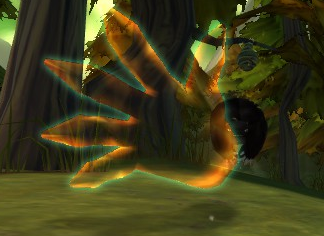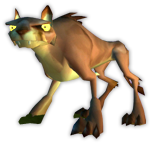
Image Courtesy of Steam
Psychonauts is an interesting concept in general. It’s a video game about a camp for psychically gifted children. These children are then suddenly appearing brainless, and the goal of the game is to figure out what’s happening to them. The player character is named Razputin, and throughout the game he encounters a number of very trying challenges that he must overcome, including a number of external and internal obstacles.
An interesting aspect of Psychonauts is the frequent tendency of Raz to solve his problems along the way by literally inserting himself into someone’s mind and reworking their minds to get them to help him. Sometimes it’s mutually beneficial, but at times it can be said that Raz left someone worse off than he found them, thus causing a conflict within the player to the effect of ‘Was it worth it?’
The most obvious form of conflict within the game Psychonauts. A few forms of conflict that can be found within the game are Man vs. Nature, Man vs. Environment, Man vs. Past, and Man vs. Authority. And that’s just a few of what the player has to deal with, several characters have their own conflict that often Razputin has to intervene in, however not every conflict has a true resolution within the game.
MAN vs. NATURE
This is the most trivial of all the conflicts within the game, throughout the stages of the game there are several psychically gifted animals that will cause Razputin some grief. The first of which would be the telekinetic bear, who pushes Raz away from some secondary objectives and slow down progress. The next would be the pyrokinetic cougar, who blocks several important paths in the game and can really mess with Raz. The Nature aspect of the game isn’t a central aspect, and can almost be entirely avoided.

Image courtesy of wikia user MentalMinx

Image courtesy of wikia user The Milkman
MAN vs. ENVIRONMENT
A very real, threatening, and at the same time unreal aspect of the game is how deadly the environment is. In the campground itself, there are very few instances of the environment trying to kill you, except for the occasional campfire. The first real instance of the environment trying to kill you, is when you enter someone’s mind for the first time.
To teach you gameplay, Raz has to go through ‘Basic Braining’ a process through which Raz (and all other campers) have to go through a mental obstacle course set forth by a man named Coach Oleander, who seems to be a veteran of war that oversees the campers and helps to train them in their abilities. The fact that players enter the minds of other individuals introduces several unique environments that are all extraordinarily dangerous, the coach’s mind has several war-torn environments, like a minefield, a field being assailed by a gun bunker, and a sequence involving destroyed planes and acrobatics.
Describing every individual mind’s unique dangers would make this post extraordinarily long, so it’s best to move on to the final, and most intriguing, conflict involving the environment. Raz vs. Water. This is a very complex element of the game in terms of conflict. Raz is incapable of going into the water, therefore he is unable to swim. However, the reason isn’t simply because he never learned how to, but rather because his family has a curse placed on it that they will all meet their end in water, because of the curse, whenever Raz attempts to enter the water, a strange hand of water attempts to pull him under, and will if the hand comes up more than twice. Therefore, Raz vs. Water is both Man vs. Environment and Man vs. Paranormal.

Image Courtesy of IGN
MAN vs. PAST
As one would expect from a game where you literally enter the minds of others, the subject of memories and the past come up to varying degrees of importance. In the mind of Oleander, for instance, the whole area is affected by his memories. However, through the use of certain collectible features—which are safes that run from you within the mind of an individual, a visual representation mental vaults—you find out that Oleander’s appearance and mental arena are just facades, and that he was kicked out of every branch of the armed service, and that he hasn’t ever gotten over the shame of it. Another instructor, named Milla Vodello, is a master of repression. She has a very bright, friendly, and nurturing demeanor and a very fun training area. However, if you manage to make it to a very difficult to even discover area of her mind, you find a vault and an open toy box. The vault shows the memory of an orphanage that she worked at—an orphanage that caught fire while she was out, that none of the children survived. If you enter the toy box, you go into a terrifying and hellish area that is surrounded by terrifying creatures, that we learn later are the physical representation of nightmares.

Image courtesy of creepygameglitchesandsecrets on Tumblr
Themes such as this are common throughout the entire game, each character has to deal with their past in some aspect. Sasha Nein, an instructor, deals with the death of his mother and his absentee father, Boyd the Guard has to deal with ‘going postal’ on his former place of employment, Gloria has to deal with her mother’s suicide due to her distancing herself from her, Edgar has to deal with the loss of his high school sweet heart to his rival, Fred has to deal with his family’s relation to Napoleon Bonaparte and his constant loss to Crispin, and Linda has to deal with her transformation into a monster.
Of course, Razputin also has to deal with elements of his past. He grew up in a circus, and had to run away to attend the camp. Throughout the game, circus themed elements represent Raz’s past, and often Raz resorts to destroying those elements to deal with them. When he learns pyrokinesis, he sets several carnival tents on fire, to learn telekinesis he throws a circus car against his family’s caravan. This is of course dealt with, but that conflict falls better under a different category.
MAN vs. AUTHORITY
Why did Raz run away from his home at the circus? Simple. He felt his father did not accept him. Raz makes several comments about this throughout the game, and in his own mindscape we find a vault that shows the environment in which he grew up in. His father was clearly very strict and dedicated to their family’s craft as acrobats. He also seems to hold a grudge against psychics, apparently tied to the curse that the gypsies placed upon their family. This caused a conflict within Raz to decide between following what he believed was his destiny and having his father’s approval. This conflict is brought forth in the final mindscape as a twisted version of Raz’s father that he must overcome. As Raz attempts to outrun rising water’s while avoiding spiked pins thrown by Raz’s ‘father’, he’ll even throw out disparaging comments about how Raz is a disappointment to his family. Thus making the conflict both external and internal.
(image courtesy of Mahalo on YouTube)
Another aspect of Man vs. Authority arises in the main antagonist of the game, who we learn is Coach Oleander. Learning that the reason that both the campers and instructors are losing their extremely powerful psychic minds because of the de facto head of the camp gives Raz an element of resistance. He must combat the corrupt system in place in order to restore a sense of true and just order to the way of things within the governance of the camp.
OTHER MINOR CONFLICTS
Throughout the game there are a few cut scenes that show the conflict of other characters who are still just going about their lives. Several girls are disgusted with a guy who’s an admitted peeping tom. Two long-time friends begin arguing when one of the friends gets a girlfriend and seems to be distancing himself from the other. A pair of band mates argue over what the name of their name should be. A wimpy camper deals with bullies and becomes an almost godfather-esque figure within the camp. Another camper, named Dogen, deals with the fear that he might be going insane. And most startlingly, the two happiest campers deal with depression and suicidal thoughts and actions. Some of these conflicts are resolved by the end of the game, but others never officially resolved.
Psychonauts is a game filled with visual metaphor—such as luggage embodying emotional baggage, mental vaults, and cobwebs hiding vaults for dark memories that no one would touch for a long time—and conflict, both internal and external. Double Fine studios did an excellent job at making a fun, interesting, and unique game that didn’t sacrifice story for gameplay, or vice versa. The over-arching conflict of the story isn’t the only component of the story, and several characters go through their own story-arcs that are independent of the story, but are themselves no less interesting.

This is a really thorough analysis of conflict. I love the way you’ve broken it down systematically by various subtypes of external conflict.
LikeLike